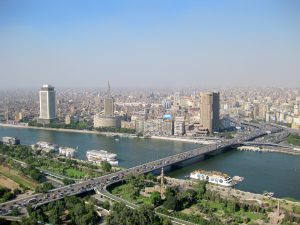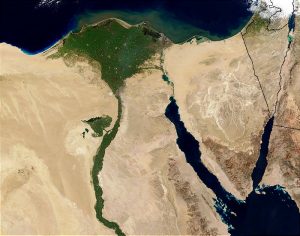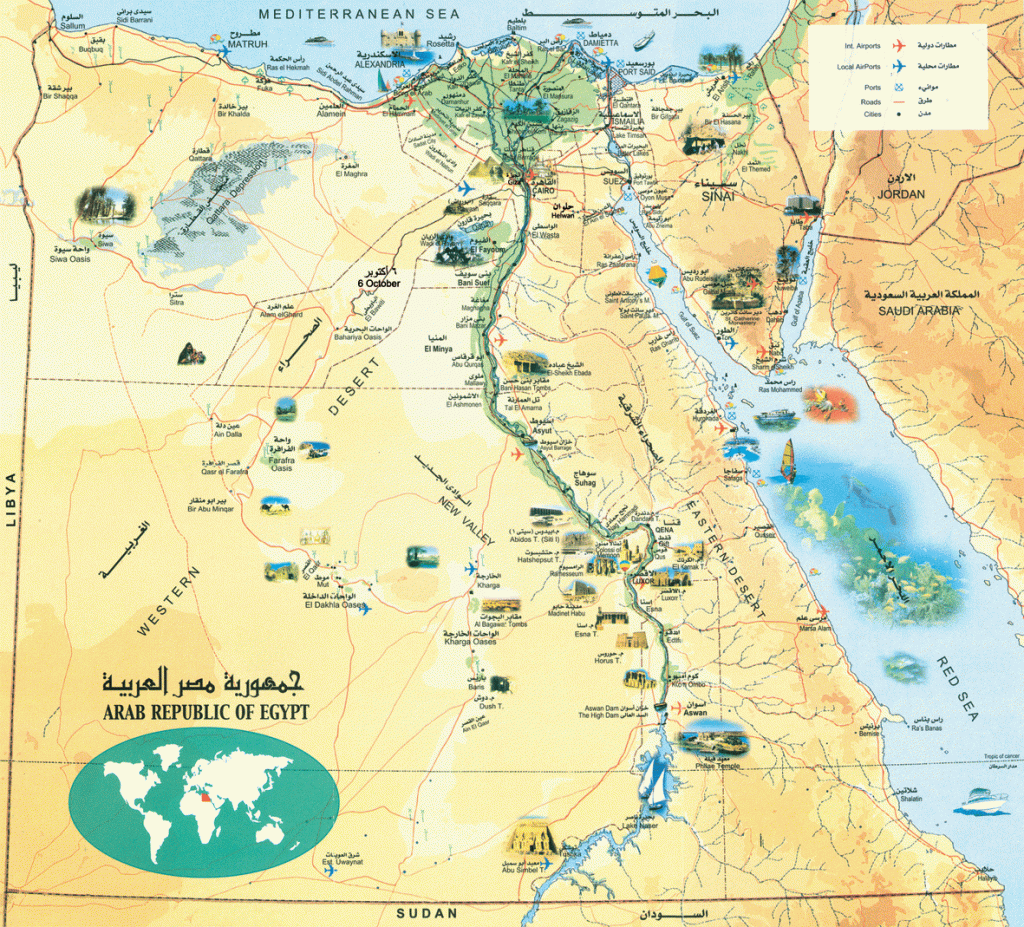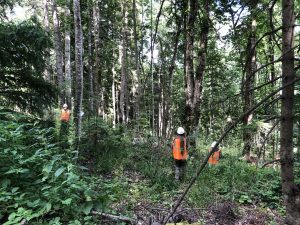Everything is different now. With the advent of the digital age, globalization, new weaponry and threats, and technological advancements like never before, the political landscape of today feels wholly transformed. We inhabit a completely new landscape for our shared political life. But despite this ever-changing political environment, one thing remains the same: people need water to survive. This remains true for every person, and every country. Egypt faces a modern conundrum: trying to adapt to the new world while providing for the most basic survival needs. Egypt suffers from water scarcity beyond previously experienced droughts.
Egypt evokes images of the famous pyramids, the legends of Cleopatra, the symbol hieroglyphics, and the king of rivers: the Nile. Perhaps we learned in school about the unification of Upper and Lower Egypt, the use of papyrus and King Tut’s tomb. But Egypt is not only an early civilization story collecting dust on a bookshelf. Egypt is alive today. Egypt, a populous, dynamic modern country in North Africa provides the passage into the Middle East and presents incredibly complex set of security challenges amidst some opportunities. After a tumultuous colonial history, Egypt underwent a dramatic 21st century transformation during its Arab Spring. Today, the country exists as a semi-democracy battling terrorism and regional conflicts with a government intent on suppressing dissidence at home. Yet, more urgent as a security issue its people need water.
Egypt’s ancient civilization thrived on the banks of the Nile River, which made it a valuable asset to any would-be conquerors. Egypt was conquered by Alexander the Great and became a Hellenistic kingdom, and eventually a province of the Roman Empire. With the advent of Islam the country was conquered and ruled by the Caliphate, and ultimately changed hands to the Ottoman Empire. As the Ottoman Empire declined, Western colonialism became the dominant power. But the Nile was not the only water-based attraction for powerful adversaries. The Suez Canal provides the only shortcut into the Mediterranean, crowning it as a powerhouse for trade that for so long the British fiercely guarded. This culminated in the Anglo-Egyptian War in 1882, which consolidated British occupation. By 1954, British occupation finally ended and Egypt elected its first president, President Nasser. After Sadat, cmae Hosni Mubarek who ruled until 2011 when he resigned forced by the popular opposition demonstrating daily during the Arab Spring.

Egypt’s 21st century revolves around the Arab Spring, which fundamentally changed the country and the region. The uprisings had different effects on each country. For some, such as Syria, the Arab Spring launched a devastating civil war displacing and slaughtering millions of people. For others, such as Tunisia, the transition was relatively peaceful. Egypt inhabited an interesting place in between. The Arab Spring brought significant unrest and violence, including the Rab’a massacre. But it also ended the rule of an authoritarian regime. Elections, though far from fair and free, limped on into the current regime. However, despite marketing his leadership as a change from Mubarek’s deposit ways, many comment on the similarities between El-Sisi and Mubarek, “Sisi echoed Mubarak’s populist, nationalistic, and conservative rhetoric […] about the danger of rapid transition and Western-backed democratisation, or what he called ‘Western template’ democracy.”1 Indeed, El-Sisi holds the all too common view that democracy cannot happen in Egypt until the threat of terrorism and conflict is neutralized.
Egypt’s victory in the so-called fourth wave of democracy fell somewhat flat. As the Sisi-led military forces seized power in 2013, they left the infamous Rab’a massacre in their wake, in which police forces killed over 1,800 people (p. 84). Terrorism increased significantly in Egypt; in 2016 2,714 attacks took place.2 For the Sisi government, the threat of terrorism justifies a tight grip on the public, including significant media suppression. This is a common sentiment in semi-democracies, which often feel that they need a period of heightened security while consolidating the new system. But it can be unclear whether that excuse is a smokescreen for more nefarious intentions. Sisi does speak in favor of democracy, but argues that the country can’t be fully democratic until the threat of terrorism and regional conflict is neutralized. Until then, it is not only permissible but essential to have a firm hand in rule of law and counterterrorism efforts. The problem is that this tough counterterrorism stance seems to be ineffective, and violates human rights in the process. “The character of [the laws El-Sisi has passed] was mostly despotic, punitive, disciplinary, and deterrent.”3 Particularly the anti-terrorism law passed in 2015, which “accelerates the state’s temptations to control information, detain journalists, and normalize its excessive use of force against dissenting voices, more than to reinforce counterterrorism efforts and combating militants.”4 El-Sisi’s regime suppresses peaceful protests, journalism, and dissidence, including through mass imprisonment. The state controlled media propagates the chosen ideology of the government and political opposition is fiercely attacked. El-Sisi may see this as necessary to stabilize the country, but the evidence suggests that this kind of suppression is actually destabilizing.
From the perspective of the government, the most pressing security issues are cut and dry: terrorism and regional instability. Indeed, these threats loom high. Domestically, Egypt is threatened by the Muslim Brotherhood and Ansar Beit Maqdis. There are regional terrorist threats in Egypt’s neighbors, such as ISIL. Additionally, the region is rife with conflicts threatening to boil over (Libya, Sudan, Israel, to name a few). But the human security issue of water threatens the most basic building blocks of society.

The current human security issues facing Egypt are typical of semi-democracies. These issues are less likely to be discussed or addressed by the government, which focuses on more traditional national security threats. El-Sisi does speak in favor of democracy, but argues that the country can’t be fully democratic until the threat of terrorism and regional conflict is neutralized. Until then, it is not only permissible but essential to have a firm hand in rule of law and counterterrorism efforts. The problem is that this tough counterterrorism stance seems to be ineffective, and violates human rights in the process. “The character of [the laws El-Sisi has passed] was mostly despotic, punitive, disciplinary, and deterrent.”5 Particularly the anti-terrorism law passed in 2015, which “accelerates the state’s temptations to control information, detain journalists, and normalize its excessive use of force against dissenting voices, more than to reinforce counterterrorism efforts and combating militants.”6 El-Sisi’s regime suppresses peaceful protests, journalism, and dissidence, including through mass imprisonment. The state controlled media propagates the chosen ideology of the government. Political opposition is targeted fiercely, as seen in the case of Ahmed Tantawy in 2024. El-Sisi may see this as necessary to stabilizing the country, but the evidence suggests that this kind of suppression is actually destabilizing.
Water security is a pressing issue in Egypt, and all of the MENA region, which is the world’s most water-scarce region.7 Some of this is natural: the Middle East is dry, hot, and arid. This kind of landscape has always required particularly strong infrastructure and governance to rise to the challenge of water provision. Governments are responsible for water waste and processing, water rationing (if needed), the use of water in hydroelectric power, managing irrigation for agriculture, and much more. It is already a tall task for a government with considerable corruption challenges. But with modern security threats and climate change, the issue of water is taking on new dimensions. The Center for Strategic and International Studies writes, “Decades of poor water management, exploding populations, and rising temperatures have degraded the region’s land and sapped its limited water supplies.”8 This region requires fresh water for basic survival, as well as for hydroelectric power. But the temperature dramatically affects the availability of freshwater, “If temperatures rise by 4°C, the region would experience a 75 percent drop in freshwater availability, and many countries in the region are expected to warm about 5°C by the end of the century.”9 The temperature impacts the rainfall. When the ground dries up, it loses the ability to retain rainfall and formerly lush floodplains turn into dangerous flooding zones. The water so desperately needed can’t absorb into the ground, thus exacerbating the vicious cycle. “A 10 per cent decrease in precipitation is expected to lead to… 30 percent less run-off in arid zones.”10 To break this cycle requires cutting edge infrastructure to efficiently clean, store, and replenish water with minimum waste. Otherwise, there is not enough water for critical industries like agriculture, and food production drops. With insufficient water, every day people will turn to consuming contaminated water, increasing the spread of diseases like cholera. Furthermore, countries rely on stable water systems (like the Nile and Suez Canal) for efficient trade. Water is not just the stuff of life, it’s the stuff of food, energy, hygiene, transportation, trade, and much more.
It’s no secret that Egypt is a critical junction with water. Around 99% of Egypt’s population lives in the Nile’s floodplains, living off of the water for their agriculture, energy, and daily water needs.11 Additionally, cotton is a major industry in Egypt, which requires a lot of water (BBC, 2023). At the center (literally and figuratively) of Egypt’s tumultuous relationship with water is the Nile River. The Nile is the world’s longest river, and one fifth of all Africans use it for their livelihood directly or indirectly.12 There are two tributaries of the Nile, with most of Egypt’s water coming from the tributary emerging from Ethiopia’s highlands. A military can’t capture a river or brute force their way into dominating the water; there’s no way around the fact that the Nile is a shared resource.
Right now, the Egyptian government would argue that the biggest threat to water security is the Ethiopian Grand Renaissance Dam (GERD), a massive infrastructure project in Ethiopia’s section of the Nile. Ethiopia also has concerns about water. The change in climate has affected their people too, and with a less developed industrial landscape and a full blown civil war, Ethiopia’s GERD serves as a point of pride. They aim to use the Nile for energy but also to fill the reservoir to stockpile the water. Egypt passionately maintains that it should have a veto power over the project. Being downstream from the GERD makes them wholly subject to Ethiopia’s water management. It has been a powerful source of nationalism for Sisi to evoke among the people. Egyptians refer to Egypt as “mother of the world,” and tend to see themselves as the primary custodians of the great river.13 “This idea that Egypt is unique, special and a gift to the world has carried through centuries and generations till today, and is now an ingrained part of the Egyptian psyche and its national pride.”14 The issue of the GERD is so important to the people that a leaked recording of President Morsi (the president in 2013, the time of the leak) announced that “the country would consider invading Ethiopia to protect its water interests if construction on the GERD began.”15 Egypt never invaded Ethiopia. But the sentiment remains.
Maybe to an American mind it sounds technical and lofty. Surely everyday citizens aren’t scrambling over water infrastructure, or concerning themselves with international construction projects. But the issue of the dam is truly close to the hearts of many Egyptians. In 2020, a group of young Egyptian hackers hacked more than a dozen Ethiopian government sites.16 The cultural battle is visible across social media like TikTok, where young Ethiopian women dance, writing, “Distracting the Egyptians while we fill the dam” (Mersie, 2020). The issue is on the mind of normal people – and young people at that. The four young hackers said “they would do anything for the Nile.”17
Clearly, if Egypt wants to address their water challenges without warfare, a national pivot is necessary. Historically, national security has been considered a winner-take-all kind of game. But this is not a tenable strategy with water security. Water security inherently requires collaboration. Rivers don’t recognize borders.
To accomplish this pivot, the government would need to approach the issue on all levels: multilaterally, nationally, and locally. Multilaterally, war is not an option for water security. The Egyptian government needs to be looking for opportunities to collaborate, rather than increasing hostilities. Ethiopia is a less developed country and currently embroiled in civil war. Backed into a corner, they’re not likely to give up leverage on one of their greatest assets. But collaboration could move them closer to a creative, visionary solution. Eleven countries share the Nile. Egypt can lead to the cause of careful stewardship and be seen as a worthy custodian of the river. Water security inherently requires a win-win situation, both logistically and morally. But provoking hostility over water rights will not lead the region to that win-win. Multilateral solutions are vital – there is no unilateral solution to water security in MENA.
Nationally, Egypt can employ the Water-Energy-Food Nexus (WEF) as a way to more responsibly manage these highly complex resources. WEF is a concept that describes a strategy for development in the age of climate change.18 WEF proposes managing these three resources in conjunction rather than as separate sectors. 19 Water, energy, and food are all intimately connected. They all take and give from one another. Water specifically produces energy and food, but relies on safe and well managed energy and food sectors. The WEF Nexus would push the government away from unsustainable solutions like oil, towards sustainable resources like solar production. In Egypt, “solar potential alone could generate sufficient electricity to match current consumption rates.”20 The WEF Nexus focuses not primarily on profit, but on supporting this tripart symbiotic relationship. Rather than asking, “how can this industry most profit?”, the nexus perspective asks, “how can these sectors most coherently thrive together?”
Finally, Egypt will need bottom-up solutions that engage the local population. Community oriented initiatives engage a tremendous amount of manpower while influencing the cultural attention on water security. There are many examples of potential initiatives. For example, experts recommend the use of “zai pits– traditional planting methods that use green water effectively and can rehabilitate abandoned land and degraded soils.”21 These practices increased harvest 2.5 to 20 fold in Ethiopia. These pits (which are very similar to rain gardens) also help to prevent flooding, which has already been effective in New Cairo.22 Rain gardens work well in the WEF Nexus system, as they help to retain water (for commercial or residential use), increase food production, prevent natural disasters like flooding, and in the long term contribute to the reversal of climate change. Beyond the enormous practical benefit, it is socially important to cultivate a sense of ownership over the land and the threat of climate change. Bottom-up solutions remind people that they too have both power and responsibility. When parents start to teach their children how to plant rain gardens, the next generation is raised in and around a both solemn and hopeful attention towards water security.

Notably, the WEF Nexus focuses on the most basic human survival needs. It encourages collaboration over competition, because everyone needs water. Could water scarcity force humanity into collaboration? It’s possible. It’s also possible that water scarcity will bring out the worst in humanity. Desperate to feed their children and survive, the likelihood of violent conflict may increase if Ethiopia and Egypt can’t find a way to collaborate. But it’s also possible that reshaping our foreign relations around our most basic human needs will usher in a cultural shift in how we imagine collaboration.
Egypt has joined a growing group of countries fighting against unilateral water security measures. Turkiye’s dams have significantly decreased Iraq’s access to water, Chad struggles to nurse its dying lake back to health, and indigenous people all over the world fight for the right to their water.23 The future seems bleak knowing that human need for water keep growing while water resources are dwindling. Multilateral cooperation to preserve, manage, and extend access to clean remains the only way forward for water security.
- Gambo, A. N. (2021), Egypt: Arab Spring, Regime Crisis and the Proliferation of Small Arms, The Palgrave Handbook of Small Arms and Conflicts in Africa, p. 88, 707-720. ↵
- Gambo, A. N. (2021), Egypt: Arab Spring, Regime Crisis and the Proliferation of Small Arms, The Palgrave Handbook of Small Arms and Conflicts in Africa, p. 85, 707-720. ↵
- Gambo, A. N. (2021), Egypt: Arab Spring, Regime Crisis and the Proliferation of Small Arms, The Palgrave Handbook of Small Arms and Conflicts in Africa, p. 89, 707-720. ↵
- Gambo, A. N. (2021), Egypt: Arab Spring, Regime Crisis and the Proliferation of Small Arms, The Palgrave Handbook of Small Arms and Conflicts in Africa, p. 90, 707-720. ↵
- Gambo, A. N. (2021), Egypt: Arab Spring, Regime Crisis and the Proliferation of Small Arms, The Palgrave Handbook of Small Arms and Conflicts in Africa, p. 89, 707-720. ↵
- Gambo, A. N. (2021), Egypt: Arab Spring, Regime Crisis and the Proliferation of Small Arms, The Palgrave Handbook of Small Arms and Conflicts in Africa, p. 90, 707-720. ↵
- Dargham, R.A., (2018), Water doesn’t come from a tap, UNICEF, https://www.unicef.org/mena/water-doesnt-come-tap, retrieved April 14th, 2025. ↵
- Hall, N. (2024). Surviving Scarcity: Water and the Future of the Middle East. Center for Strategic and International Studies. https://features.csis.org/surviving-scarcity-water-and-the-future-of-the-middle-east/#:~:text=Today%2C%20the%20Middle%20East%20is,disappearing%20before%20our%20very%20eyes retrieved: April 14th, 2025. ↵
- Hall, N. (2024), Surviving Scarcity: Water and the Future of the Middle East, Center for Strategic and International Studies, https://features.csis.org/surviving-scarcity-water-and-the-future-of-the-middle-east/#:~:text=Today%2C%20the%20Middle%20East%20is,disappearing%20before%20our%20very%20eyes retrieved: April 14th, 2025. ↵
- Krampe, F. Van de Goor, L. Barnhoorn, A. Smith, E. Smith, D., (2020), The Nile and Juba-Shelle Basins, p. 19, Stockholm International Peace Research Institute. ↵
- Mahmoud, M., (2024), The Looming Climate and Water Crisis in the Middle East and North Africa, Carnegie Endowment for International Peace, https://carnegieendowment.org/research/2024/04/the-looming-climate-and-water-crisis-in-the-middle-east-and-north-africa?lang=en, retrieved April 14th, 2025. ↵
- Krampe, F. Van de Goor, L. Barnhoorn, A. Smith, E. Smith, D., (2020), The Nile and Juba-Shelle Basins, p. 14, Stockholm International Peace Research Institute. ↵
- Halawa, H., (2022), Egypt’s Decade of Water Woes, p. 5, Istituto Affari Internazionali. ↵
- Halawa, H., (2022), Egypt’s Decade of Water Woes, p. 5, Istituto Affari Internazionali. ↵
- Halawa, H., (2022), Egypt’s Decade of Water Woes, p. 4, Istituto Affari Internazionali. ↵
- Mersie, A., (2020), The Ethiopian-Egyptian Water War Has Begun, Foreign Policy, https://foreignpolicy.com/2020/09/22/the-ethiopian-egyptian-water-war-has-begun/, retrieved April 14th, 2025. ↵
- Mersie, A., (2020), The Ethiopian-Egyptian Water War Has Begun, Foreign Policy, https://foreignpolicy.com/2020/09/22/the-ethiopian-egyptian-water-war-has-begun/, retrieved April 14th, 2025. ↵
- Keulertz, M., & Mohtar, R., (2022), The water-energy-food nexus in Libya, UAE, Egypt and Iraq, p. 2, Istituto Affari Internazionali. ↵
- Keulertz, M., & Mohtar, R., (2022), The water-energy-food nexus in Libya, UAE, Egypt and Iraq, p. 3, Istituto Affari Internazionali. ↵
- Keulertz, M., & Mohtar, R., (2022), The water-energy-food nexus in Libya, UAE, Egypt and Iraq, p. 13, Istituto Affari Internazionali. ↵
- Beg, L., (2018, December 23), Opinion: Harvesting rain to improve crops across Africa, Stockholm Resistance Centre, https://www.preventionweb.net/news/opinion-harvesting-rain-improve-crops-across-africa, retrieved April 14th, 2025. ↵
- Ismaeel, W. S., & Mustafa, N. A., (2025), Practical Steps for Urban Flood Risk Mitigation Using Nature-Based Solutions—A Case Study in New Cairo, Egypt, Land, 14(3), 586. ↵
- Mahmoud, M., (2024), The Looming Climate and Water Crisis in the Middle East and North Africa. Carnegie Endowment for International Peace. https://carnegieendowment.org/research/2024/04/the-looming-climate-and-water-crisis-in-the-middle-east-and-north-africa?lang=en retrieved April 14th, 2025. ↵



26 comments
Rebecca Amaya
An unexpected fact about Egypt’s security challenges is that the Nile River is the reason for destabilization of the country, because of its relation to water scarcity. This is apparently more threatening than military conflicts, which is astuonding. The country’s survival of national identity are limited to this single water source. This article resonates with me because something as simple as water, has such a tremendous impact on the livelihood of its people and the environmental pressure to reshape diplomacy. In what ways can Egypt cooperate with upstream nations like Ethiopia to secure water access without escalating tensions?
Teagan McSherry
It was surprising to learn how the geopolitical tensions arising from water scarcity highlight the complex interplay between environmental resources and national security. Understanding that over 95% of Egypt’s population lives along the Nile resonated with me, highlighting the Nile River’s vital role in daily life. In your opinion, how important is diplomatic collaboration in addressing the tensions over Nile River water use between Egypt and other nations?
Carollann Serafin
1) I was shocked to learn about the urgent need for water to be available in the country. I feel like this is such a common occurrence in many countries and it is really disheartening.
2) The best point that was made that resembled my point was learning about the economic and political standpoint in regards to issues occurring.
3) I would ask the question what made you most interested in this topic and what was your inspiration for it.
TJ
The author does a great job of showing how Egypt’s water crisis is not just an environmental issue but also a political one. I liked how the article highlighted both international conflicts over the Nile and local government challenges. It was interesting to see how everyday citizens are affected by these large-scale issues. The writing is clear and informative, and I appreciated the balance between big-picture politics and on-the-ground impacts like water access.
Micaella Sanchez
Reflecting on Egypt’s water crisis, I’m struck by how a fundamental human need, water, reveals the limits of power and sovereignty. No army can conquer a river. It’s clear to me that the path forward demands humility, collaboration, and innovation. Egypt’s future won’t be secured by force, but by cooperation. Water scarcity reminds me that we are all, ultimately, in this together.
Ixchel Mireles
Hello Sarah,
I completely agree with the amount of change that has happened to the political landscape. I loved how much advocacy your research brings to the water scarcity in Egypt. With everything that Egypt offers and the rich historical background, the water scarcity issue gets overlooked. The topic on climate change coincides with the task that the government of Egypt has continued to lack to find a solution and take preventive measures to stop climate change. The solution of creating cutting edge infrastructure to efficiently store water that you propose could work well especially with helping the political landscape issues you described. The dependence of water for human survival needs to be the top priority for Egypt. Although my only concern is how much pollution would the new innovative infrastructure put back out in the earth ?
Lashanna Hill
What was unexpected to me in learning about their security challenges was their water scarcity tied to modernism or the lack there of. The best part of the story that resonated with me was the explanation of how semi-democracies are ignored by their government. How the current El-Sissi regime suppresses peaceful protests, journalism and dissidence that signifies the concerns of the people.
What can Egypt do to foster more cooperation with Ethiopia to shift concerns on the concerns of water conserving and how prolonged conflicts play a determinable role in preventing it?
Jesse Turnquist
I found this read to be very well-written and interesting, stating factual information on Egypt’s landscape and the security challenges it has and continues to face. Despite multiple terrorist factions, the Arab Spring, and political challenges Egypt is faced with, I was very surprised by how much of an issue water is—not only for them but for the region—and how much further of an issue it will be for them if not solved quickly. What are your thoughts on the best ways to solve this issue that are not only efficient but may also lead to new ideas and ways to produce fresh, clean water?
Mia Ramirez
I found your article to be very informative and storytelling! The most surprising thing I learned about in this article is that the biggest threat to water security in Egypt is caused by the Ethiopian Grand Renaissance Dam. The best part of this story is the learning about the Water Energy Food connections linked to the most basic human need which is water. This part of the story resonated with me because water scarcity is an issue that all countries should worry about. My question: how is Egypt going to surmount such water scarcity?
Karicia Gallegos
Something that was unexpected to me in learning about the security challenges this country faces is how severe Egypt’s water scarcity issue is, especially considering how closely tied the country is to the Nile River. The best part of this story that most resonated with me is the discussion of how El-Sisi uses the threat of terrorism to justify limiting freedoms, because it shows how complicated the balance between security and human rights can be. A question I would ask the author is what specific technological innovations could Egypt implement to improve water conservation and distribution?